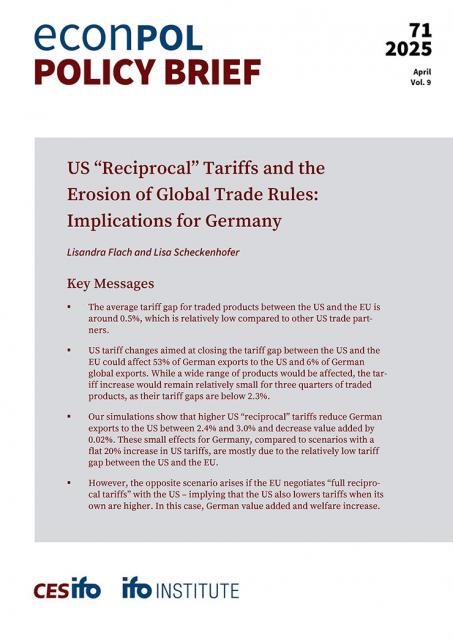News Archive

EconPol Europe: How to Encourage Citizens to Identify More with Europe?
|
EconPol Policy Report
| News
Authors of a new study conducted jointly by the Centre for European Economic Research (ZEW), Mannheim, and the ifo Institute for the EconPol Europe research network recommend that policymakers should do more to encourage citizens to identify with Europe. The authors suggest that Pan-European political consciousness could be encouraged by having citizens vote for European party lists, rather than national party lists in the European elections. An EU Citizens’ Assembly, say the report’s authors, should serve as a platform to discuss specific political issues and propose potential solutions. Europe could also raise its profile overseas through shared EU embassies and consulates.
... Details

Tragedies Like Greece Must Not Be Repeated
|
EconPol Opinion
| News
The third bail-out programme for Greece ended in August, but the crisis isn’t over. Nine years after the crisis broke, public debt still amounts to 180 percent of gross domestic product, a level incompatible with stable economic development. There have been improvements: the increase in public debt has been brought to a halt, exports of goods and services almost match the level of imports, and unemployment fell below 20 percent in June 2018, the lowest rate since September 2011. But the country can only recover if it implements further reforms, and it must do so independently of further bail-outs. And, if we are to avoid a similar tragedy in Greece or elsewhere, the Eurozone must change too.
... Details

Dissecting the EU’s Recent Anti-Tax Avoidance Measures
|
EconPol Policy Report
| News
Profit-shifting activities by multinational enterprises (MNEs) is widespread. Academics and policymakers agree that such activity should be curbed by diminishing the opportunities that exist within the international tax system The EU has legislated to reduce the scope for such activity, with a central tool being the Anti-Tax Avoidance Package.
In this EconPol policy report, the authors argue that while elements of the package are likely to raise the minimum standards of anti-tax avoidance measures in Europe, they still leave scope for tax-planning. At the same time, the measures may lead to double taxation. They will also make the tax code more complex and distort firms’ decisions, generating social costs as a result. The balance between benefits and costs is not satisfactory. The authors discuss the pros and cons of other instruments like withholding taxes and formulary apportionment. While these measures would be of some help, in the long term, a fundamental reform of the international tax system is necessary.
... Details

How to Boost Productivity in the EU
|
EconPol Policy Brief
| News
Advances in total factor productivity (TFP) are important for sustaining economic growth in modern economies, in particular in the face of a declining working-age population. In this Policy Brief, we identify investment in research and development, good governance, the capital intensity, a high share of information technology in the total capital stock, and the number of industrial robots per employee as conducive for TFP growth. Based on the empirical results, policies that are beneficial for capital formation in general, investment in computer technology, research and development as well as the use of industrial robots could boost TFP in Europe.
... Details

Funding Constraints and Market Illiquidity in the European Treasury Bond Market
|
EconPol Working Paper
| News
Financial markets routinely experience a variety of frictions that hinder their efficient functioning by impacting price formation. These frictions are usually due to how trading is organized in a market, regulatory constraints, or trading capital. EconPol expert Sophie Moinas (TSE) and her co-authors propose an empirical investigation of the dynamic relationships between funding and market illiquidity measures in the European Treasury bond market. They find that funding illiquidity shocks affect bond market illiquidity and of a weaker, but significant, reverse feedback effect. Their analysis also shows that the responses of individual bonds' market illiquidity to funding illiquidity shocks increase with bond duration, the credit risk of the issuer, and with haircuts.
... Details
